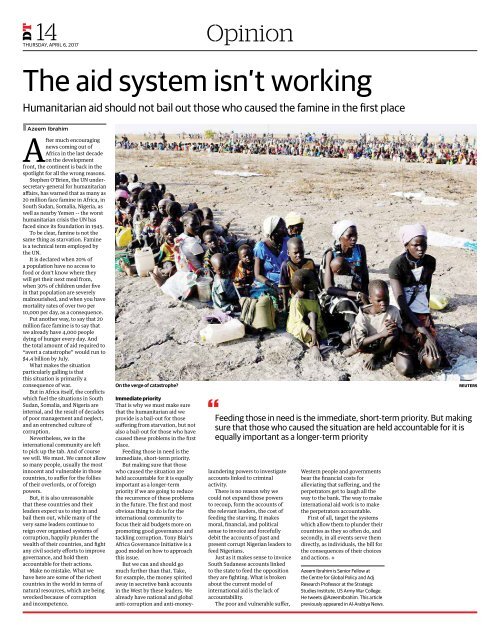DT e-Paper 06 April 2017
Create successful ePaper yourself
Turn your PDF publications into a flip-book with our unique Google optimized e-Paper software.
14<br />
THURSDAY, APRIL 6, <strong>2017</strong><br />
<strong>DT</strong><br />
Opinion<br />
The aid system isn’t working<br />
Humanitarian aid should not bail out those who caused the famine in the first place<br />
• Azeem Ibrahim<br />
After much encouraging<br />
news coming out of<br />
Africa in the last decade<br />
on the development<br />
front, the continent is back in the<br />
spotlight for all the wrong reasons.<br />
Stephen O’Brien, the UN undersecretary-general<br />
for humanitarian<br />
affairs, has warned that as many as<br />
20 million face famine in Africa, in<br />
South Sudan, Somalia, Nigeria, as<br />
well as nearby Yemen -- the worst<br />
humanitarian crisis the UN has<br />
faced since its foundation in 1945.<br />
To be clear, famine is not the<br />
same thing as starvation. Famine<br />
is a technical term employed by<br />
the UN.<br />
It is declared when 20% of<br />
a population have no access to<br />
food or don’t know where they<br />
will get their next meal from,<br />
when 30% of children under five<br />
in that population are severely<br />
malnourished, and when you have<br />
mortality rates of over two per<br />
10,000 per day, as a consequence.<br />
Put another way, to say that 20<br />
million face famine is to say that<br />
we already have 4,000 people<br />
dying of hunger every day. And<br />
the total amount of aid required to<br />
“avert a catastrophe” would run to<br />
$4.4 billion by July.<br />
What makes the situation<br />
particularly galling is that<br />
this situation is primarily a<br />
consequence of war.<br />
But in Africa itself, the conflicts<br />
which fuel the situations in South<br />
Sudan, Somalia, and Nigeria are<br />
internal, and the result of decades<br />
of poor management and neglect,<br />
and an entrenched culture of<br />
corruption.<br />
Nevertheless, we in the<br />
international community are left<br />
to pick up the tab. And of course<br />
we will. We must. We cannot allow<br />
so many people, usually the most<br />
innocent and vulnerable in those<br />
countries, to suffer for the follies<br />
of their overlords, or of foreign<br />
powers.<br />
But, it is also unreasonable<br />
that these countries and their<br />
leaders expect us to step in and<br />
bail them out, while many of the<br />
very same leaders continue to<br />
reign over organised systems of<br />
corruption, happily plunder the<br />
wealth of their countries, and fight<br />
any civil society efforts to improve<br />
governance, and hold them<br />
accountable for their actions.<br />
Make no mistake. What we<br />
have here are some of the richest<br />
countries in the world in terms of<br />
natural resources, which are being<br />
wrecked because of corruption<br />
and incompetence.<br />
On the verge of catastrophe?<br />
Feeding those in need is the immediate, short-term priority. But making<br />
sure that those who caused the situation are held accountable for it is<br />
equally important as a longer-term priority<br />
Immediate priority<br />
That is why we must make sure<br />
that the humanitarian aid we<br />
provide is a bail-out for those<br />
suffering from starvation, but not<br />
also a bail-out for those who have<br />
caused these problems in the first<br />
place.<br />
Feeding those in need is the<br />
immediate, short-term priority.<br />
But making sure that those<br />
who caused the situation are<br />
held accountable for it is equally<br />
important as a longer-term<br />
priority if we are going to reduce<br />
the recurrence of these problems<br />
in the future. The first and most<br />
obvious thing to do is for the<br />
international community to<br />
focus their aid budgets more on<br />
promoting good governance and<br />
tackling corruption. Tony Blair’s<br />
Africa Governance Initiative is a<br />
good model on how to approach<br />
this issue.<br />
But we can and should go<br />
much further than that. Take,<br />
for example, the money spirited<br />
away in secretive bank accounts<br />
in the West by these leaders. We<br />
already have national and global<br />
anti-corruption and anti-moneylaundering<br />
powers to investigate<br />
accounts linked to criminal<br />
activity.<br />
There is no reason why we<br />
could not expand those powers<br />
to recoup, form the accounts of<br />
the relevant leaders, the cost of<br />
feeding the starving. It makes<br />
moral, financial, and political<br />
sense to invoice and forcefully<br />
debit the accounts of past and<br />
present corrupt Nigerian leaders to<br />
feed Nigerians.<br />
Just as it makes sense to invoice<br />
South Sudanese accounts linked<br />
to the state to feed the opposition<br />
they are fighting. What is broken<br />
about the current model of<br />
international aid is the lack of<br />
accountability.<br />
The poor and vulnerable suffer,<br />
Western people and governments<br />
bear the financial costs for<br />
alleviating that suffering, and the<br />
perpetrators get to laugh all the<br />
way to the bank. The way to make<br />
international aid work is to make<br />
the perpetrators accountable.<br />
First of all, target the systems<br />
which allow them to plunder their<br />
countries as they so often do, and<br />
secondly, in all events serve them<br />
directly, as individuals, the bill for<br />
the consequences of their choices<br />
and actions. •<br />
Azeem Ibrahim is Senior Fellow at<br />
the Centre for Global Policy and Adj<br />
Research Professor at the Strategic<br />
Studies Institute, US Army War College.<br />
He tweets @AzeemIbrahim. This article<br />
previously appeared in Al-Arabiya News.<br />
REUTERS


















